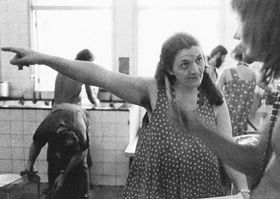Women in charge
The organizations that grew around Osho were partly organic, arising spontaneously in response to perceived needs, and partly shaped and directed by him. Quite early in that process, in Mumbai, a woman came to be in charge of everything that was needed and happening around him. This was Ma Yoga Laxmi, who went on to run everything in Pune One as well. She was efficient, heartful, devoted to Osho, and open to attempting the impossible, especially if the only constraints were time and people-power, mere logistical hurdles.
Testimony to this can be found in Rakesh's account of the preparing of Buddha Hall in March 1977, written as commentary in The Zero Experience: "[Buddha Hall] is now a rough foundation of cement with iron rods sticking up in the air everywhere. Nevertheless, bhagwan wants no one to miss this special darshan, so instead of the usual chuang tzu auditorium, he says to prepare buddha hall. People giggle somewhat madly, but laxmi, bhagwan's secretary and personal mountain-mover, says her usual 'It will happen'. Now that's surrender! And, it does happen".
As Osho's movement grew exponentially, a grand experiment grew with it. Observing that women had been abused and held back for centuries and millennia by men, often citing divine guidance, Osho saw an opportunity to release both sexes from needless shackles and address social inequities by having women explicitly put in charge of, well, just about everything. It started with Laxmi, down through her immediate assistants and then department heads.
As devices go, it was brilliant, giving both women and men a chance to explore inner obstacles to their growth: prejudices, attitudes, beliefs regarding sex-based roles were dismantled or exploded in ways tailored to individual needs: the situation itself would decide the details of lesson to be imparted.

Not that it was necessarily easy! Some of these women were difficult. The best example of that was probably Deeksha, the Italian Zen mama who ran Vrindavan, the kitchen and handyman dept. She was famous for being erratic, irrational and demanding, but her difficult aspect was a part of the device. Osho said once, in a quote that became a classic justification for the authoritarian structure of the ranch and its demands for surrender:
- It is very easy to surrender to me, difficult to surrender to Deeksha. So I will insist that you surrender to Deeksha; that is the way to surrender to me. Deeksha will be a harder thing to surrender to. To me you can surrender easily because I don't come into your day to day, moment to moment work. So this has to be learned by everybody. ~ from The Zero Experience ch 13
This could not go on forever of course. Eventually such lessons as could be learned from such structures were learned. And on the other side, women "in power" had other lessons to move on to, so the inevitability of this authority structure faded, but it had a long run. The idea that women in charge would create a softer, more loving vibe needed to be tested, and so when it was, it was found to have some truth but it was also limited. And exploring these limitations was a growth experience for all!
